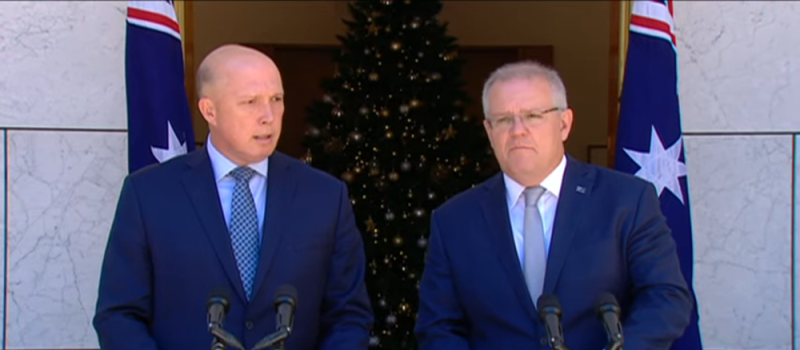The Coalition's decision to repeal a law that secures healthcare rights for refugees is astoundingly cruel, writes Binoy Kampmark.
“WE HAVE Cabinet ministers in here like lemmings coming in here to vote for a Bill we haven’t seen.” These words from Labor Senator Penny Wong was pointed and relevant to one of the darker chapters in Australian political history. And there have been a few. The Medevac legislation, a necessary law to combat the needlessly cruel state of affairs for asylum seekers on Manus Island and Nauru, is no more.
Passed in the last sitting week of 2018, it privileged medical opinion in determining the need for emergency medical treatment over political expediency. That did not, as often misrepresented by the Morrison government, remove ministerial discretion altogether. Home Affairs Minister Peter Dutton could still block transfers, as he had done.
To the Morrison Government, it was a puncture in the scheme of "Fortress Australia", a possible aperture in the edifice that might permit people of "loose moral character" a means of coming to the Australian mainland. The theme of terror and moral degeneracy was encouraged.
As Dutton claimed with groundless relentlessness:
“People of bad character can come, are able to come and, in fact, are required to come under Labor’s laws that they passed. That’s the reality.”
Last February, Prime Minister Scott Morrison expressed the view with misplaced gravity that:
“Someone who’s a paedophile, who’s a rapist, who has committed murder – any of these other crimes – can just be moved on the say-so of a couple of doctors on Skype.”
On Tuesday, the Medevac provisions were done to death, the result of a seedy if sketchy understanding between Government members in the Senate and Tasmanian Senator Jacqui Lambie.
“Today,” lamented former senior medical officer on Nauru Nick Martin, “Australia became just a little crueller, just a little more sadistic.”
A law that had been working well, Martin went on to observe:
“Was repealed because a self-professed Christian thought that his values aligned with denying care to the vulnerable.”
Senators knew that something was afoot. On Monday, Senator Lambie was blustery and demagogic:
It’s about time the people in this place woke up to China’s attempts to infiltrate our economy and our democracy. Both sides of politics need to take a good hard look at themselves and make sure they’re acting in our national interest, which, quite obviously, over China, they are not.
The Tasmanian senator proved terrier-like, even manic, claiming that Australians were “sitting ducks here". The attempts by the Chinese Community Party to infiltrate the Australian parliament were “not some wacky conspiracy theory”. In a time-honoured fashion of terror towards the Yellow Peril from the North, Lambie succumbed: “they’re coming".
As Richard McGregor of the Lowy Institute has suggested, having a debate about China and its relationship with Australia is important.
Nevertheless, McGregor has said:
“But there is little doubt that in some cases it reaches deep into an insecure part of the Australian psyche, about not just being the odd man out in Asia, but also in a region which will be dominated by China rather than the U.S.”
This irate mood was stirred by recent revelations from Bo “Nick” Zhao, a 32-year-old luxury car dealer, that a Chinese spy ring was willing to part with $1 million for Zhao to run as a candidate for the Liberal Party. ASIO’s director-general, Mike Burgess, went for the bait: “hostile foreign intelligence activity continues to pose a real threat to our nation and its security.”
It got even better. Liberal Senator Mathias Cormann insisted that there was no secret deal to speak of with Lambie. One Nation leader Senator Pauline Hanson excoriated Labor for being righteous: “I will not sit here and listen to the Labor Party, greater than all thou, as if they’ve never done their deals".
Speculation began circulating that it might have involved an agreement to accept New Zealand’s offer to take 150 asylum seekers as a measure to relocate refugees not taken up by the U.S.
Shadow Home Affairs Minister Kristina Keneally suggested:
“If the Prime Minister has done a backflip, if he has decided to accept New Zealand’s offer to take refugees on Manus and Nauru, that is a change in policy, he should announce it to the Australian people.”
A teary Lambie, seemingly racked by guilt, refused to reveal what the basis of her agreement with the Government was, despite Senator Cormann’s claims to the contrary. What had changed hands for the guaranteed misery of those who could not now rely on emergency treatment on Australian soil?
Lambie told us:
“I don’t like holding back things like this. But when I say I can’t discuss it publicly due to national security concerns, I am being 100 percent honest with you.”
She confessed to having a hand on her heart, “and I can stand here and say that I would not be putting at risk Australia’s national security and national interest if I said anything else about this.”
The obvious question to ask is whether such politics should ever be secret, along with the sordid dealing that comes with it. For a democratic chamber, refusing to discuss the basis of repealing a significant item of legislation in exchange of silence on a matter of vague security importance is pitiful indeed. Accountability cannot be gauged in silence. Unfortunately for this, a precedent has been set.
Senator Wong’s words furnish us a salient warning:
“We should not be voting on legislation which is predicated on a backroom deal no-one has seen.”
Dr Binoy Kampmark was a Commonwealth Scholar at Selwyn College, Cambridge. He lectures at RMIT University, Melbourne. You can follow Dr Kampmark on Twitter @BKampmark.
 This work is licensed under a Creative Commons Attribution-NonCommercial-NoDerivs 3.0 Australia License
This work is licensed under a Creative Commons Attribution-NonCommercial-NoDerivs 3.0 Australia License
Support independent journalism Subscribe to IA.












